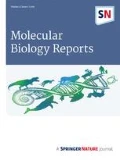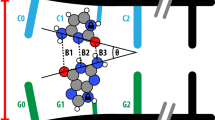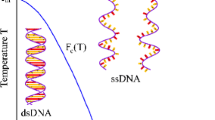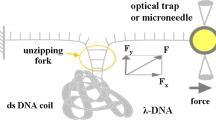Abstract
Malignancies are caused by genetic or environmental factors. Esophageal carcinoma can be triggered by consumption of hot food and beverages. Here we propose that high temperature is one of the culprits and it leads to DNA denaturation. Subsequently the exposed hydrogen bonding acceptors in single stranded DNA attract protons which enhance the formation of mutagenic and carcinogenic strong acids such as HCl. Faster mutation of single-stranded DNA viruses than that of double-stranded DNA viruses lends support to this theory.
Similar content being viewed by others
Data availability
Not applicable.
Code availability
Not applicable.
References
Tang M, Zhou Y, Li Y et al (2017) Hydrogen donors and acceptors and basic amino acids jointly contribute to carcinogenesis. Med Hypotheses 98:42–44. https://doi.org/10.1016/j.mehy.2016.11.014
Hodgson SV, Morrison PJ, Irving M (2004) Breast cancer genetics: unsolved questions and open perspectives in an expanding clinical practice. Am J Med Genet C Semin Med Genet 129 C(1):56–64. https://doi.org/10.1002/ajmg.c.30019
Tai WP, Nie GJ, Chen MJ et al (2017) Hot food and beverage consumption and the risk of esophageal squamous cell carcinoma: a case–control study in a northwest area in China. Med (Baltim) 96(50):e9325. https://doi.org/10.1097/MD.0000000000009325
Abnet CC, Arnold M, Wei WQ (2018) Epidemiology of esophageal squamous cell carcinoma. Gastroenterology 154(2):360–373. https://doi.org/10.1053/j.gastro.2017.08.023
An S, Li X, Tang M et al (2020) The role of acetate in the antagonization of oxalate: a potential causative molecule for heart disease and cancer death. Nat Prod Commun 15:1934578
Wan Y, Ma X, Li Y et al (2020) Local strong acids: A driving force for metastasis. Med Hypotheses 144:110221. https://doi.org/10.1016/j.mehy.2020.110221
Greene CL, Worrell SG, DeMeester TR (2015) Rat reflux model of esophageal cancer and its implication in human disease. Ann Surg 262(6):910–924. https://doi.org/10.1097/SLA.0000000000001207
Moayyedi P, El-Serag HB (2021) Current status of chemoprevention in Barrett’s esophagus. Gastrointest Endosc Clin N Am 31(1):117–130. https://doi.org/10.1016/j.giec.2020.08.008
Ibrahim-Hashim A, Estrella V (2019) Acidosis and cancer: from mechanism to neutralization. Cancer Metastasis Rev 38:149–155. https://doi.org/10.1007/s10555-019-09787-4
Tornos C, Silva E, el-Naggar A et al (1990) Calcium oxalate crystals in breast biopsies. The missing microcalcifications. Am J Surg Pathol 14(10):961–968. https://doi.org/10.1097/00000478-199010000-00010
Scimeca M, Bonfiglio R, Menichini E et al (2019) Microcalcifications drive breast cancer occurrence and development by macrophage-mediated epithelial to mesenchymal transition. Int J Mol Sci 20(22):5633. https://doi.org/10.3390/ijms20225633
Park JY, Mitrou PN, Luben R et al (2009) Is bowel habit linked to colorectal cancer? Results from the EPIC-Norfolk study. Eur J Cancer 45:139–145. https://doi.org/10.1016/j.ejca.2008.10.002
Tsugane S (2005) Salt, salted food intake, and risk of gastric cancer: epidemiologic evidence. Cancer Sci 96:1–6. https://doi.org/10.1111/j.1349-7006.2005.00006.x
Wactawski-Wende J, Kotchen JM, Anderson GL et al (2006) Calcium plus vitamin D supplementation and the risk of colorectal cancer. New Engl J Med 354:684–696. https://doi.org/10.1056/NEJMoa055222
Xing M, Chen Z, Cui L et al (2019) Yogurt and green tea regimen in the preventions of heart disease and cancer in men. Eur J Prev Cardiol 26(7):NP3–NP4. https://doi.org/10.1177/2047487318800769
Sanjua´n R, Nebot MR, Chirico N et al (2010) Viral mutation rates. J Virol 84:9733–9748. https://doi.org/10.1128/JVI.00694-10
Schirmer B, Neumann D (2021) The function of the histamine H4 receptor in inflammatory and inflammation-associated diseases of the gut. Int J Mol Sci 22(11):6116. https://doi.org/10.3390/ijms22116116
Coleman HG, Xie SH, Lagergren J (2018) The epidemiology of esophageal adenocarcinoma. Gastroenterology 154(2):390–405. https://doi.org/10.1053/j.gastro.2017.07.046
Ma X, Wang Y, Liu Q (2021) Hydrogen bonding capacity in DNA attracts protons and prompts the formation of mutagenic and carcinogenic HCl. Eur J Cancer Prev. https://doi.org/10.1097/CEJ.0000000000000673
An S, Liao L, Lin Y et al (2021) Widespread hydrogen bonding in the proteins of HIV-1 may confer carcinogenic risks to AIDS patients. DNA Repair 101:103101. https://doi.org/10.1016/j.dnarep.2021.103101
Sanjuán R, Domingo-Calap P (2016) Mechanisms of viral mutation. Cell Mol Life Sci 73(23):4433–4448
Lam C, Liao L, Liu Q (2021) Why RNA viruses evolve more quickly than DNA viruses? A concern for cancer patients during the current pandemic. Eur J Cancer Prev. https://doi.org/10.1097/CEJ.0000000000000672
Zhang X, Ma X, Gan T et al (2020) Secondary chemical bonding between insoluble calcium oxalate and carbonyl oxygen atoms of GLY and VAL residues triggers formation of Aβ aggregates and their deposition in the brain. ACS Chem Neurosci 11:4007–4011. https://doi.org/10.1021/acschemneuro.0c00662
Acknowledgements
Discussions with Weiguo Cao are appreciated. We thank Yan Shi for language editing.
Funding
This work was supported by grants from the Science and Technology Transformation Program of Sun Yat-sen University of China (33000-18843234) and Guangzhou Science and Technology Program (201804010328) to QL.
Author information
Authors and Affiliations
Contributions
QL conceived and supervised the study, analyzed the data and wrote the first draft. YL conducted the literature search and analyzed the data, and co-wrote first draft. XZ, JZ and YW conducted the literature search and analyzed the data, and wrote and revised the second draft. All authors read and approved the final manuscript.
Corresponding author
Ethics declarations
Conflict of interest
The authors declare that they have no conflict of interest.
Ethical approval
This article does not contain any results with human participants or animals performed by any of the authors.
Additional information
Publisher’s Note
Springer Nature remains neutral with regard to jurisdictional claims in published maps and institutional affiliations.
Rights and permissions
About this article
Cite this article
Lin, Y., Zhang, X., Wang, Y. et al. Single-stranded DNA generated by high temperature accepts protons and builds up mutagenic and carcinogenic strong acids. Mol Biol Rep 48, 7633–7635 (2021). https://doi.org/10.1007/s11033-021-06804-0
Received:
Accepted:
Published:
Issue Date:
DOI: https://doi.org/10.1007/s11033-021-06804-0




